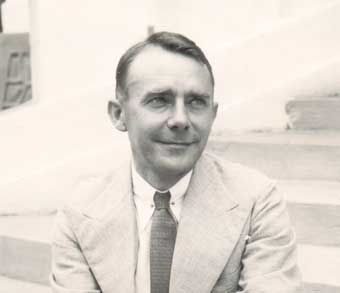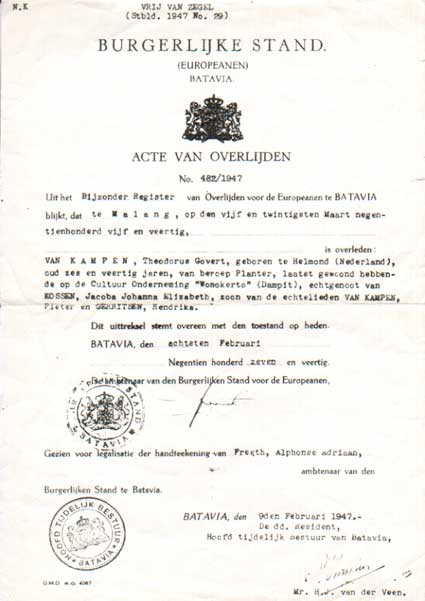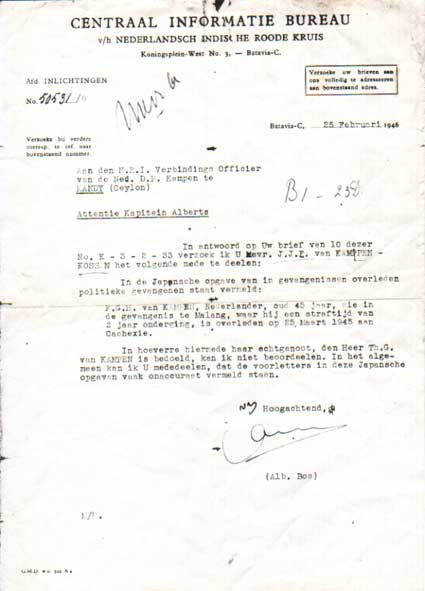The death of my beloved father

My sister Henny had to go to the military hospital in Kandy since she still suffered from jaundice, luckily this was a good hospital. To our alarm my mother was from one day to the other paralysed on the left side of her face and body so she had to be rushed to the hospital as well. Poor mother, the war and all the stress about still not receiving any news from or about my father had been far too much for her to bear. Only a week later my youngest sister Jansje had to be brought to the hospital as well, she had the measles.
I was now all by myself in the Camp B1 from Kandy, I really felt very lonely but I was happy that I could visit my mother and my two sisters daily in the hospital that was not too far away from our camp.
At the end of January 1946 my mother received a letter from my aunt Miep, who was already in Holland. She wrote that she had found my father's name on the death list from the Dutch East Indies. My mother, Henny and I were completely heartbroken, my youngest sister didn't understand what was happening, she was still very apathetic and couldn't remember my father. Luckily I was brought by car to our camp B1 by an English soldier, I couldn't stop crying all the way back. I have always been an optimist, I never ever expected for one moment that I could lose my father during the Japanese occupation of the Dutch East Indies. I could not sleep all night, I kept on seeing my fathers last gentle smile that he gave me in Malang on the 16th of April, my sixteenth birthday in 1943. It was the last time that I had seen my father and it was his smile that was forever printed in my memory.
The next day I slowly began to hesitate to believe that my father died, maybe it was all a mistake, maybe he was missing and was now temporary in some other prison or camp, maybe outside Malang. I couldn't believe that he was dead, not my father. But at the same time I also became indifferent towards the people around me, and that was something I had never felt before. I had lost my best friend and I found this so much harder to bear than my own war experiences, losing my father did cut deep into my soul. Only now, did World War Two hurt me so deeply as nothing else could have done earlier.
At last my mother and two younger sisters came “home” again, they were all three cured and felt a lot better, thank goodness. At the end of February or the beginning of March 1946 my mother received a letter from the Red Cross in Batavia, today Jakarta, mentioning that according to the Japanese statements of the deceased political prisoners, my father died in the Malang prison of Cachexie, dehydration. But it was only in February 1947 that my mother received my fathers official act of death, also coming from Batavia.
It was around the 15 th of May 1946 that we left Sri Lanka, the s.s. Kota Baroe, was the ship that brought us to Rotterdam, to the Netherlands, a country I hardly knew, the country I had always seen as the country from my grandparents.


My father
Burgelijke Stand
Centraal Informatie Burea



